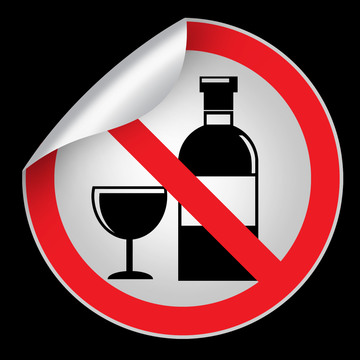
By MarcoMontero93 - Own work, CC BY-SA 4.0, Wikimedia
Alcohol is a psychoactive substance used in many cultures for social and recreational reasons. However, excessive consumption of this substance poses a great problem to the individual. The burden of harmful alcohol use especially among the young and middle age groups has been on a steady rise.
The harmful effects of excessive alcohol consumption can be discussed under 3 broad categories namely the biological effects, the psychological effects, and the social effects. These are put together as the biopsychosocial effects of alcohol and in this post, I will discuss each of these effects. But before we go into that, let's look at the global burden of harmful alcohol consumption and why this awareness is very important.
According to the World Health Organisation, WHO,
Worldwide, 3 million deaths every year result from the harmful use of alcohol. This represents 5.3% of all deaths.
Overall, 5.1% of the global burden of disease and injury is attributable to alcohol, as measured in disability-adjusted life years (DALYs).
Alcohol consumption causes death and disability relatively early in life. In people aged 20–39 years, approximately 13.5% of total deaths are attributable to alcohol.
So let us look at the many harmful effects of excessive alcohol consumption.

BIOLOGICAL EFFECTS OF ALCOHOL ABUSE

When alcohol is consumed, 98% of it is metabolized in the liver. Therefore, harmful alcohol consumption results in liver damage described as alcoholic liver disease. This liver disease can also progress to hepatocellular carcinoma. Harmful alcohol consumption can also cause inflammation and erosion of the inner lining of the stomach. This may result in bleeding and vomiting of blood.
Excessive alcohol consumption can also cause damage to the pancreas (chronic pancreatitis), peptic ulcer disease, increased risk of respiratory infections like Tuberculosis and pneumonia, etc. There can also be fetal alcohol syndrome in babies of women who consume excessive alcohol during pregnancy.
Other health consequences of harmful alcohol consumption include cardiovascular problems like hypertension, abnormal heart rhythms, and dilated cardiomyopathy. Cancers of the gastrointestinal system. Neurologic dysfunction, exacerbations of pre-existing medical conditions, etc.
Alcohol consumption is also a major cause of road traffic accidents and accidents at home, risky sexual behavior, and increased risk of infections like HIV/AIDS, etc.
The list of diseases caused by or aggravated by harmful alcohol consumption is very broad and according to the World Health Organisation, alcohol is responsible for over 200 diseases. Therefore, it is very important that those who consume alcohol excessively limit their consumption to the barest minimum to stay healthy and safe.

PSYCHOLOGICAL EFFECTS OF ALCOHOL ABUSE

In addition to the biological effects listed above, there are also many psychological effects of harmful alcohol consumption. These are discussed below.
Alcohol causes psychological dependence and withdrawal symptoms like severe anxiety, hallucinations, etc. Other psychological effects of excessive alcohol consumption include low self-esteem and lack of motivation. Those who are chronic alcohol users feel less of themselves and most times, they lack the focus and motivation to pursue their life goals. They may also have memory impairment, personality disturbances, or psychosis.

SOCIAL EFFECTS OF HARMFUL ALCOHOL INTAKE

Excessive consumption of alcohol also has social consequences. Those who are chronic alcoholics are generally seen as irresponsible persons in society. People lose the confidence to trust them with important responsibilities. As a consequence, some of them can even lose their jobs or source of livelihood.
Some also find it difficult to maintain a happy home. They may be agents of domestic violence and family breakup.
Other social effects of excessive alcohol consumption include sexual promiscuity, and social vices like stealing, violence, etc. Some may have poor grades in school or even drop out of school.

PREVENTION OF ALCOHOL ABUSE

From the discussions so far, we have looked at the various consequences of alcohol abuse and it is therefore important to prevent it.
The most important goal of this prevention is RESPONSIBLE DRINKING. For those who can abstain totally from alcohol, it is encouraged, especially pregnant women, those with chronic medical conditions, those on any medication, individuals less than 21 years, previous alcohol dependence, etc.
Experts advise that men should take less than 21 units of alcohol per week while women should take less than 14 units of alcohol per week. There should also be at least 2 non-drinking days per week.
It is also important not to drink while driving or drive while drinking. This will help to prevent road crashes associated with excessive alcoholism.
Most importantly, individuals should set their drinking limit and follow it. The circle of friends also matters a lot. Those who hang out with friends who drink heavily also tend to drink heavily too. So maintain friends that drink responsibly and don't drink on an empty stomach.
You also have to be assertive and turn down drinks politely when offered beyond your limit. It is also helpful to create other enjoyable activities to replace drinking. Such activities can include sports, cinema, sightseeing, picnic, etc.
Those who develop withdrawal symptoms can see a psychotherapist for adequate care.

By Atlantic Training, CC BY-SA 3.0, Wikimedia
Thanks for reading and those who drink, please always remember to DRINK RESPONSIBLY!
For references and further reading, please visit;









